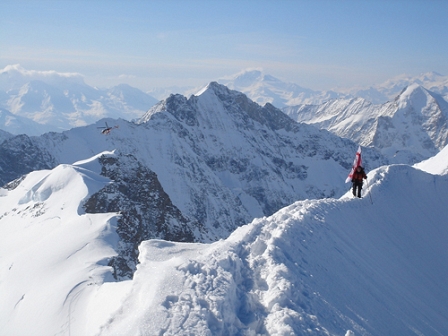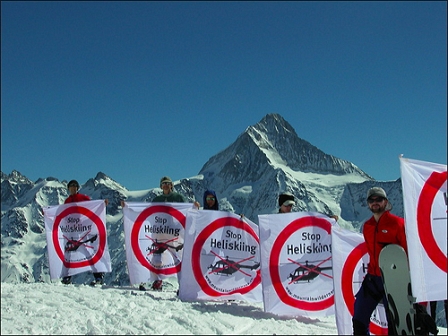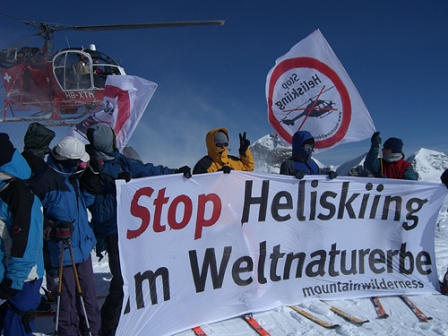Erstellt am: 4. 5. 2010 - 16:19 Uhr
The End of Heliskiing in Europe?
If you want to keep enjoying the snow at this time of year you've got to go high. And those who are thick-walleted enough often choose spring to charter a helicopter which will whisk them, in a matter of minutes, out of the flower-strewn valleys and up to the icy heights of the Alpine powder trails .
It's no longer possible in France and Germany, where heliskiing has already been banned due to environmental concerns, and it's a highly exclusive sport here in Austria, where only two landing sites are open - both in Vorarlberg. But in Switzerland dozens of the locust-like helicopters are taking off every day, making it, for the moment at least, the undisputed European capital of heliskiing.
Heli-tourism flights make up part of the estimated 15,000 helicopter flights every year in Switzerland. Free riding in the splendid isolation of the high mountains without having to walk is a dream for many people - a dream that many riders are prepared to spend a minor stimulus plan on realising.

Mountain Wilderness
But the snow-lover's dream is a growing nightmare for environmentalists such as Rolf Meier from the group Mountain Wilderness: He questions whether, in these supposedly eco-conscious days, a pleasure involving a loud and fuel-guzzling helicopter is it a justified pleasure?
There are 42 landing sites spread across Switzerland - much to the dismay of green groups like Mountain Wilderness, who complain that 22 of them are located in supposed “protected areas” including the UNESCO World Heritage of Nature site, the Lauterbrunnen valley.
Rold Meier and his group are now pushing for a ban on the sport and have gained the backing of many of Switzerland’s largest environmental groups including the WWF. Meier says the main problem is the noise the helicopters make. He insists the whirring of the blades overhead isn’t just a pesky annoyance for those seeking mountain tranquility, but also threatens wildlife. “The noise occurs not only where the helicopters land, but throughout their flight over the terrain. This creates a threat to the world of wild animals particularly in the wintertime when animals are already in a weakened state because of the shortage of food.” He adds that disturbing noises force animals to expend valuable energy trying to escape from helicopters which they perceive as a danger. Ecologists have complained that noise means the wildlife of the Alps rarely come to complete rest, and this has begun to impacting their breeding habits.

Mountain Wilderness
Mountain Wilderness is not pushing for any restrictions on flights for non-touristic reasons, recognising that modern mountain life is unimaginable without the frequent of use helicopters. In Switterland there are the ubiquitous red and white helicopters of course. The sound of the frantic whirr of their spinning rotors as the medical teams approach wasp-like from behind the Alpine peaks always sends a shiver down my spine, making me think of orange stretchers, x-rays, insurance policies and boring months of rehab. But for many a mountain ‘Wirt’, the sound of the blades is a banal promise of new deliveries of beer and Berner Würstel. With this is mind, proponents of the sport insist a ban on heliskiing would do little to reduce the traffic in the mountains. Indeed, they argue, the only significant measurable result of a ban would be a downturn in the local mountain economies: Daniel Sulzer, the head of the helicopter company, told the BBC that a ban would mean job losses: “I would have to send people home.”
But Rolf Meier is not moved: He’s seen a great increase in heli-tourism, which now encompasses heli-trecking, heli-biking and, believe it or not, heli-fishing. He says these activities are simply not ethically justifiable in an age of climate change, pointing out that 180 litres of fuel (per hour flight) are used to transport four persons.

Mountain Wilderness
So what does Meier recommend for the lovers of heliskiing – if their sport is taken away? The answer is as simple as it is obvious – get some skins and walk. The pristine snow and the glory of the mountains in spring are likely to hang around for at least a few decades more but in Switzerland, as in other parts of Europe, the environmentalists would like to see you pant for your pleasures. “Alpinists are able to climb the same peak under their own power and not damage the environment.” Meier recommends taking a local guide to positively impact the mountain economy and to avoid the danger of avalanches. He says the sense of triumph you feel in having climbed the mountain with your own muscle power will mean the long run through the powdery Alpine wilderness is “double as much fun.”


